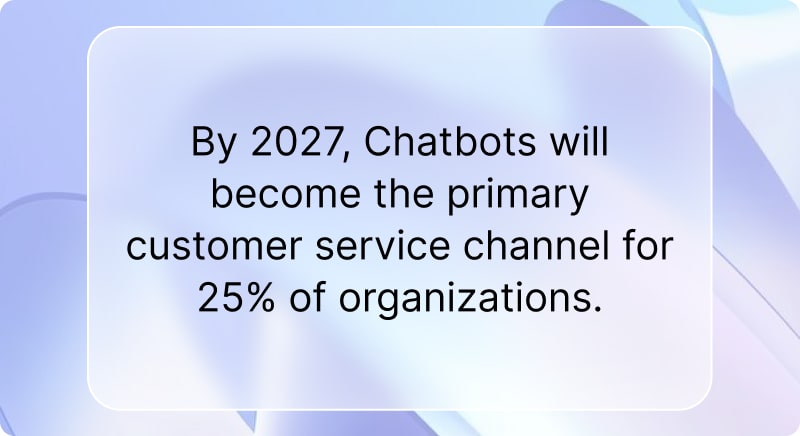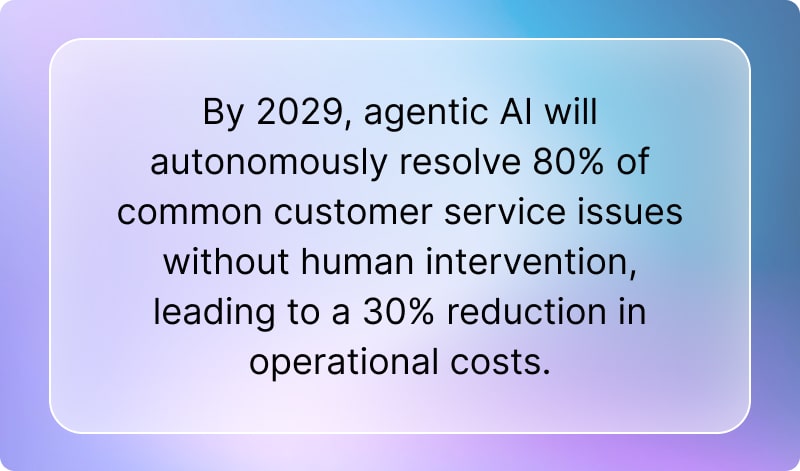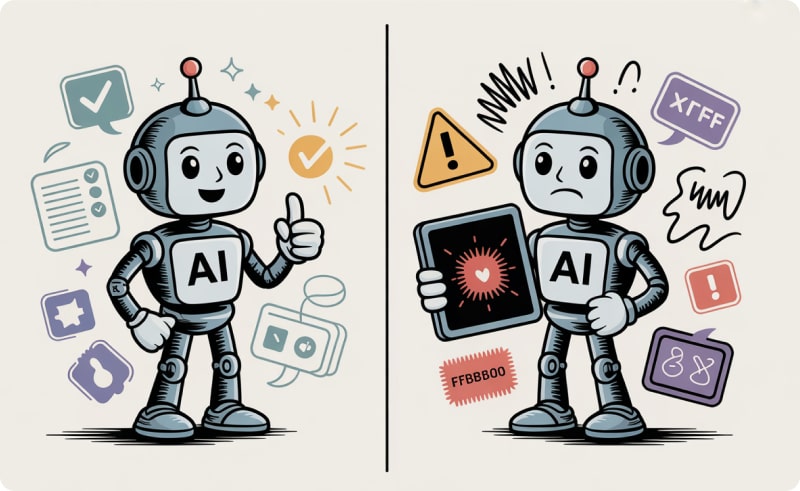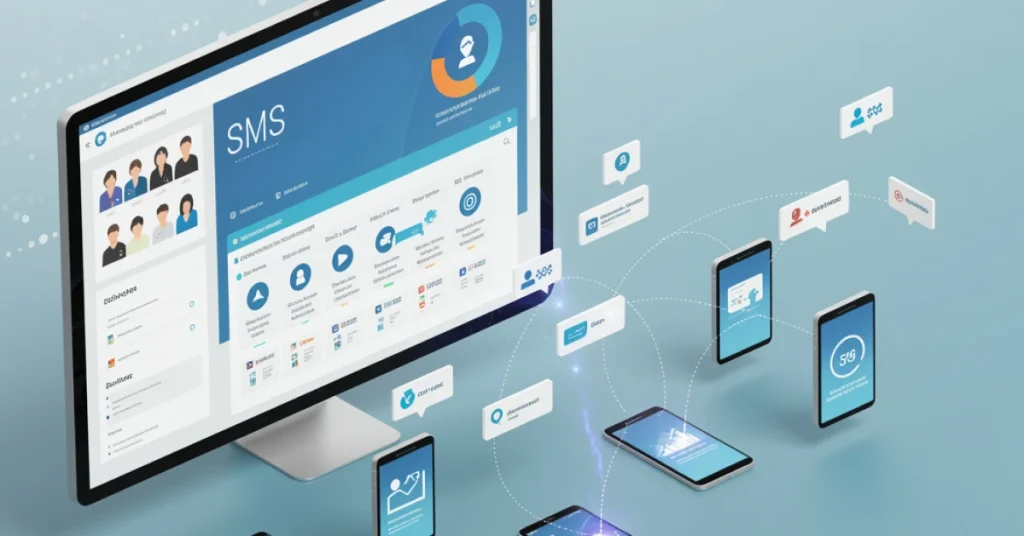How AI will Transform Customer Experience in 2026
- November 19, 2025
- 14 Mins Read
- Listen

We live in an era where, truly, the customer is the king, and their expectations are changing faster than ever. They want quick replies, personalized interactions, and seamless support, no matter the channel they choose. And this is exactly where Artificial Intelligence (AI) in Customer Experience (CX) is making the biggest impact.
From smart chatbots to predictive analytics, AI is empowering companies to deeply understand customer behavior, automate repetitive tasks, respond faster, and deliver a relevant experience at every touchpoint. This fusion of human empathy and computational power is bringing rapid transformations in the customer experience landscape.
In this blog, we are going to break down this transformation, highlight the benefits it brings, and peek into where AI will take CX next.
The Role of Artificial Intelligence in Customer Experience

AI is a present reality, and it has already become a center point within the modern customer experience ecosystem. At the same time, we need to understand that AI is not going to replace humans; however, it can do things that can be simply amazing.
What exactly does AI do in customer service? Well, primarily, it performs 4 different tasks:
- It listens, i.e., pays attention to every customer interaction.
- It learns, i.e,. understands customer behavior and feedback.
- It adapts, i.e., modifies in real time to deliver more relevant responses.
- It predicts, i.e., what customers are likely to need even before they ask.
In short, AI helps human agents work smarter and deliver better experiences.
“Is AI actually improving customer service, or just making it more frustrating?” – A Real Customer Concern
Source: Reddit
This is one of the most debated questions online today, even appearing in community discussions like Reddit, where users openly express concerns, mixed experiences, and expectations from AI-powered support models.
While AI promises faster responses, personalization, and 24/7 availability, not every implementation results in a smooth, human-like experience. The gap often occurs because many businesses deploy AI as a quick fix rather than a thoughtfully trained system integrated with real customer behavior, emotional context, and seamless escalation paths.
For some customers, AI chatbots feel like a blessing, resolving simple queries instantly without waiting in long call queues. But for others, especially those needing human empathy, complex troubleshooting, or personalized decisions, poorly designed AI support can feel dismissive and frustrating. The reality is this: AI is not inherently good or bad; the outcome depends on how intelligently, responsibly, and contextually it is implemented. Businesses that blend AI efficiency with human oversight are the ones delivering truly satisfying customer experiences.
Understanding the AI-Driven Customer Journey

From the moment a customer discovers your brand to the point they become loyal advocates, AI quietly works in the background to reshape the customer journey by adding intelligence, speed, and personalization at every touchpoint. Here’s how it supports every stage of the journey:
1. Awareness & Discovery
It starts by studying user behavior. By searching for patterns, browsing history, and analyzing interests and sentiment, AI connects the dots to understand what customers are looking for. Thus helping brands to reach the customers at the right time with the right products.
2. Consideration
At this stage, hyper-personalization takes the lead. By processing massive volumes of structured and unstructured data, such as purchase history, chat logs, social sentiment, etc., AI builds a real-time 360° customer profile. It then uses these profiles to deliver personalized suggestions that match the customer’s needs, budget, and preferences. The result? It makes the research process easier and helps customers arrive at decisions faster.
3. Purchase
AI brings more smoothness to a customer’s buying experience. Virtual assistants help users compare different options, navigate issues during checkout, and remove friction that might block a purchase. AI even interprets signals like clicks, location, or time of day to determine and deploy the “next-best-action,” which could be a proactive reminder, a tailored offer, or escalating to agent support. It’s like having a personal guide throughout the buying process, resulting in a confidence-boosting purchasing experience.
4. Support
After the purchase, customers want instant and accurate help. AI-powered self-service tools, enhanced by advanced NLP, can handle complex, intent-driven conversations besides the basic queries. Chatbots, knowledge bases, and voice assistants resolve issues quickly. They also route complex issues to the right agents, reducing wait times and boosting satisfaction.
5. Loyalty & Retention
AI uses predictive analytics to strengthen long-term customer relationships. It does so by identifying when customers might be losing interest or planning to switch. It then triggers timely interventions such as recommending personalized offers, reminders, or loyalty rewards to keep them engaged. This proactive approach keeps the customers connected and turns one-time buyers into long-term loyal customers.
AI in Customer Experience: Industry-Specific Use Cases

AI is reshaping customer experience across industries, delivering personalization, automation, and real-time intelligence. Here’s a look at how different sectors are using AI to transform their customer journeys.
1. Retail & E-commerce
AI helps brands deliver smooth shopping experiences with:
- Product Recommendations: Suggesting products that customers are more likely to buy.
- Smart Inventory & Order Updates: Predicts which products will be in demand and sends automated order/shipping updates.
- AI Shopping Assistants: Helping customers find the right product, compare prices, or check availability instantly
2. Banking & Financial Services
AI ensures secure, fast, and highly personalized customer experiences with:
- Fraud Detection: Monitoring unusual account activity in real time and generating alerts if something looks suspicious.
- Personalized Financial Advice: Analyzing spending patterns and offering insights like saving suggestions, investment reminders, or bill alerts.
- Intelligent Virtual Banking Assistants: Handling queries like balance checks, card status, or EMI calculations.
3. Telecommunications
AI is reshaping how telecoms support millions of customers by:
- Predictive Network Maintenance: Identifies network issues before they affect customers, prevents downtime, and improves service quality.
- Smart Call Routing for Contact Centers: Determines why a customer is calling and routes them to the right agent, reducing average handling time.
- Churn Prediction: Identifies customers who are likely to leave based on usage patterns and complaints, enabling proactive retention campaigns.
4. Healthcare & Telemedicine
AI improves patient experience, accessibility, and care outcomes with:
- Automated Appointment Scheduling: Book, reschedule, or cancel appointments without human involvement.
- Patient Triage & Symptom Checking: Collect symptoms and suggest next steps, helping hospitals manage patient flow efficiently.
- Personalized Care Reminders: Sends medication reminders, follow-up alerts, and wellness notifications to improve patient. outcomes.
5. Travel & Hospitality
AI helps deliver faster, more personalized customer journey experiences by:
- Dynamic Pricing: Adjusting prices for flights, hotels, and tours based on demand, season, and customer behavior.
- Hyper-Personalized Guest Experiences: Helping hotels personalize services using data from past stays.
- Real-Time Travel Support: Providing instant updates on flight delays, gate changes, bookings, and itinerary suggestions.
6. Insurance
AI helps customers navigate complex claims and policy processes by:
- Automated Claims Processing: Reads claim documents, verifies details, and accelerates approvals, reducing manual work and speeding up settlements.
- Fraud Risk Identification: Detects anomalies in claim patterns to help insurers prevent fraudulent cases.
- Virtual Insurance Advisors: Chatbots help customers choose policies, calculate premiums, and understand benefits.
7. Automotive
- Predictive Vehicle Maintenance: Predicts which parts of a vehicle may fail soon based on driving data and alerts customers proactively.
- Car Dealership CX Chatbots: Guide customers through car selections, financing options, test drive bookings, and feature comparisons.
- Connected Car Experience: Updates drivers about traffic, fuel needs, service centers, and navigation tips.
8. Real Estate
AI enhances experience across buyers, tenants, and agents.
- Smart Property Recommendations: Suggests properties based on the buyer’s location preference, budget, lifestyle, and search patterns.
- Virtual Assistants for Property Queries: Chatbots instantly answer questions about pricing, amenities, loan eligibility, and site visits.
- Predictive Valuation: Predicts future property value based on market trends, demand, and neighborhood growth.
7 Key Benefits of AI for Customer Experience
The above use cases demonstrate that AI isn’t supplementary to CX anymore; it’s a foundational component of modern CX strategy. From faster support, hyper-personalization to smarter decision making, there are numerous ways in which AI helps brands in better understanding, communicating, and serving their customers.
1. Hyper-personalization at Scale
Today’s customers expect brands to remember them – about their interests, past issues, and buying preferences. AI makes this level of personalization possible for millions of customers at once. analyzes vast amounts of customer data, browsing patterns, past conversations, purchase history, sentiment, and even interaction timing in real-time to tailor recommendations, offers, and even the content/tone of service interactions. The outcome? more relevant conversations, higher engagement, and better conversions
2. Faster, Always-Available (24/7/365) Support

Today, customers don’t have time waiting for help. AI-powered chatbots and virtual assistants provide instant support anytime. From answering common queries, guiding customers through processes, and resolving issues without queue delays, AI remains available regardless of business hours or holidays, meeting customer demands for immediate assistance.
3. Predictive Insights for Proactive Service
Using Predictive Analytics, AI anticipates customer needs or potential issues, e.g., predicting a service disruption, a product expiring, or customer dissatisfaction, and triggers communication before the customer has to reach out. This means instead of reacting after something goes wrong, AI helps brands trigger personalized retention programs, turning risk into opportunity. Here’s a key insight businesses can’t ignore: 90% of call centers that use AI predict customer churn more accurately. Source
4. Reduced Operational Costs & Agent Workload

AI automates routine, high-volume, and repetitive tasks, such as data collection, ticket categorization, call routing, appointment booking, and basic troubleshooting. This significantly lowers operational costs, improves support efficiency, and allows human agents to focus on high-priority and emotionally complex cases.
5. Decision-Making Backed by Real Data
AI uses Natural Language Processing (NLP) to analyze customer feedback, chats, and calls in bulk, detecting emotions and intent, and converts them into actionable insights. This is far beyond what humans can do in a reasonable amount of time. Brands get clarity on what customers want, which communication channels perform the best, where bottlenecks exist, and what improvements drive ROI. The outcome is smarter business decisions and better CX design.
6. Consistent Omnichannel Experience
AI integrates data across all channels (web, chat, email, phone, social media) so the customer never has to repeat themselves, and agents always have context, regardless of the channel used. This means every interaction becomes part of one unified history.
7. Improved Emotional Intelligence
AI doesn’t just comprehend what customers say, it also understands how they feel. With tone, keywords, and sentiment analysis, AI identifies whether a customer is frustrated, confused, or satisfied, enabling brands to respond more sensitively and accurately.
In short, AI creates a win-win scenario: customers receive faster, smarter, and more personalized service, while the business achieves greater cost-efficiency through proactive capabilities.
Challenges and Ethical Considerations in AI-Powered CX
Remember the saying ” With great power comes great responsibility” ? As brands move toward AI-driven customer engagement, they must balance innovation with privacy, fairness, transparency, and ethical usage. This is important because customer trust is at stake. AI can significantly transform CX, but we must understand that it comes with its own set of flaws and challenges.
So when considering deploying AI for customer service and experience, brands should consider the following:
1. Data Privacy & Compliance
The working of AI systems depends heavily on different types of data that help personalize CX; however, it also raises concerns about how that data is used – collection, storage, sharing, and processing of data. Brands should always comply with global privacy standards, including GDPR, CCPA, HIPAA, and PCI-DSS. Furthermore, they should be transparent about what customer data is used and why. This helps protect user rights and prevent misuse.
2. Bias & Fairness in AI Decision-Making
AI models learn from the data they are trained on, and if that data reflects historical or societal prejudices, the AI may unintentionally reproduce unfair outcomes. These biases could be related to gender, language style, nationality, accent, financial status, or ethnicity, and the bias could result in an unfair disadvantage or advantage for certain groups of people. To prevent this, companies must continuously audit datasets, test outputs across diverse groups, and include human oversight to ensure decisions remain fair and inclusive.
3. Risk of Over-Automation & Loss of Human Touch
Automation is beneficial, but too much automation can sometimes lead to frustrated customers. Suppose a customer is facing a complex issue and gets emotionally sensitive. In such a scenario, reliance on chatbots can create dissatisfaction or customer churn. Businesses should understand that a healthy balance between AI technology and human intervention is essential to gain maximum success in CX. This means AI can handle repetitive and simple tasks while human agents handle empathy-driven, high-impact conversations.
4. Security & Cyber Threat Vulnerabilities
AI systems connect to multiple databases, communication channels, and analytics platforms for their operations. However, this integration makes them targets for cyberattacks, which is why proper security of these systems is crucial. Brands should ensure End-to-end encryption, Multi-factor authentication, Continual monitoring for anomalies, Secure APIs and integrations, and Regular penetration testing.
In essence, ethical, secure, fair, and transparent use of AI will lead to stronger trust, loyalty, and brand advocacy in the long term.
The Future of AI-Driven Customer Experience – What’s Next?

What we are witnessing today is just the first chapter; AI in CX will move from being an essential supporting tool to becoming a strategic experience engine. Let’s see what advancements are going to shape the next era of customer experience.
1. Fully Autonomous CX
Today, AI assists. Tomorrow, AI will act, decide, and execute in real time. Intelligent systems will automatically:
- Detect customer intent
- Offer relevant solutions
- Escalate when truly necessary
- Learn continuously without manual re-training
AI agents will no longer act as secondary support channels. According to a 2025 Gartner survey, 51% of consumers show willingness to use GenAI assistants, which means blended human-AI support models will become standard across industries. Self-service will move from “press 1 for support” to “Just tell me, and I got this.”
2. Intelligent Conversation Understanding
AI will go beyond transcribing or analyzing keywords. Sentiment, tone, facial expressions, pace, and behavioral cues will be interpreted in real time to understand what customers mean, not just what they say. If a customer sounds anxious or confused, AI systems may adjust tone, switch to a human agent, or offer step-by-step guidance automatically. This will deepen empathy, not replace it.
3. Ethical, Transparent, & Customer-Controlled AI
AI adoption will accelerate only if customers continue to trust it. Transparency, opt-in choices, and data usage clarity will be core to future CX models.
Customers will increasingly ask:
- “How is my data being used?”
- “Can I opt out?”
- “Is this AI or a human?”
Brands that communicate openly will win loyalty.
4. Hyper-Adaptive Personalization
AI will deliver dynamic and mood-based personalization, not just product suggestions. Offers, support channels, and experience journeys will adjust in real time based on intent, emotion, and recent actions. A frustrated customer may bypass bot interactions and get priority access to a specialist immediately.
5. Immersive & Experiential AI
Tomorrow’s customer experience won’t be limited to chat windows or voice calls. With emerging technologies like augmented reality (AR) and virtual reality (VR), brands will allow customers to experience products and services before they commit. Retailers may offer virtual fitting rooms or 3D home décor previews, while travel companies could let customers “walk through” resorts and rooms before booking.
In one line, we can say that the future of AI in CX is all about giving every customer the feeling that they are the only one. With 70% of call centers gearing up to invest more in AI, the industry is heading toward a hybrid human-AI workforce model focused on speed, personalization, and predictive support.
Key Takeaway
If businesses are still debating AI adoption, consider this: 86% of customers appreciate AI specifically for fast resolution, meaning slow responses directly translate to dissatisfaction and eventual churn.
Customers no longer compare you only with direct competitors; they compare you with the fastest, smartest, and most seamless digital experiences they’ve ever had. In a world where loyalty is built on convenience, personalization, and instant outcomes, AI is no longer a futuristic add-on but a core pillar of modern CX strategy.
Brands that move early will not only delight their customers but also build scalable support operations, achieve stronger retention, and stand out as experience-led market leaders. The question now is no longer “Should we implement AI?” but rather “How quickly can we deploy and optimize it for maximum impact?”
Want to give your customers a smoother, smarter experience with AI? Let our team handle the heavy lifting. We’ll manage the AI side for you, so you can focus on what you do best – taking care of your customers. Let’s build your next-gen CX, together.

























